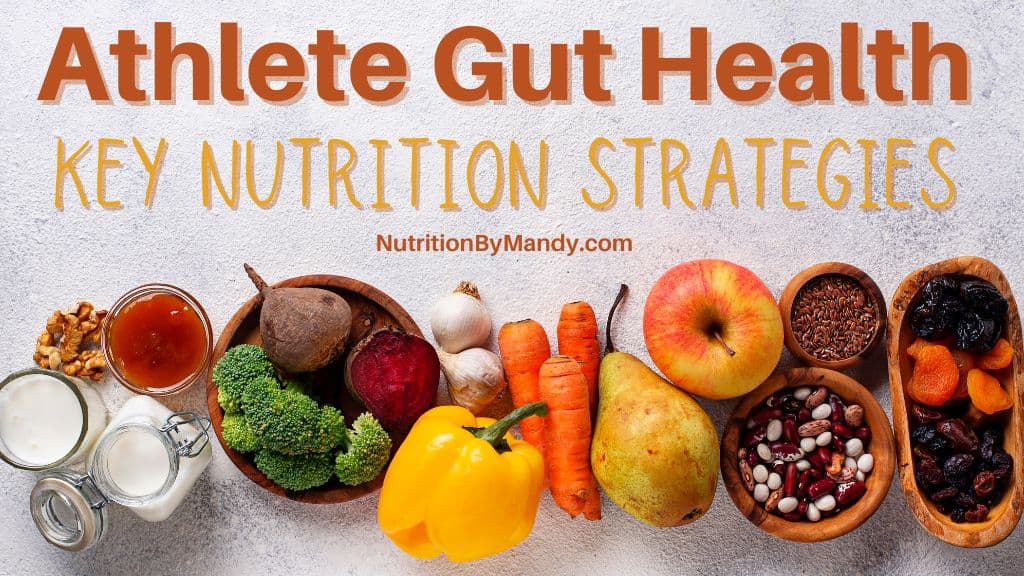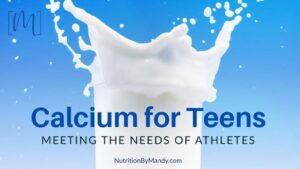Last Updated on June 8, 2025 by Mandy Tyler, M.Ed., RD, CSSD, LD
Key Nutrition Strategies to Support Athlete Gut Health
*This article includes affiliate links. As an Amazon Associate, I earn from qualifying purchases.
Prioritizing gut health is important for athletes. A healthy gut supports digestion, nutrient absorption, the immune system, and promotes overall health and well-being.
Despite the importance of gut health, I find it is an area often overlooked by athletes when discussing their sports nutrition goals.
Let’s explore key nutrition strategies to support optimal gut health for athletes.
Healthy Gut Microbiome
An individual’s gastrointestinal tract contains over 100 trillion microorganisms, including bacteria, viruses, and yeast (1).
Beneficial gut bacteria have many important roles in the body, including (1, 2, 3):
- Nutrient metabolism and absorption
- Combating pathogens
- Promoting a healthy immune system response
- Production of vitamins
Thus, taking steps to support the development of a diverse, healthy gut microbiota is of benefit to athletes.

Keys to Supporting Athlete Gut Health
When it comes to optimizing gut health, there are four nutrition strategies that I commonly recommend to athletes, including:
- Increase your intake of foods containing probiotics
- Add in fiber-rich foods and prebiotics
- Make hydration a daily priority
- Focus on variety
Let’s take a look at each of these nutrition strategies to support gut health in more detail.
Probiotics for Athlete Gut Health
The first step that athletes can take to promote a healthy gut is to include a variety of probiotic-rich foods in their meal plan.
Probiotics are live strains of microorganisms, such as bacteria, that have beneficial impacts on an individual’s health (4). Probiotics support the development of a healthy, diverse gut microbiome and help to counteract the activity of pathogens in the gut (4).
There are numerous different strains of probiotic microorganisms, which confer different health benefits in the body (4). Therefore, athletes should aim to consume a variety of probiotic-rich foods in their diet.
What Foods Contain Probiotics?
Probiotics can be found in many types of fermented foods. Microorganisms are involved in the fermentation process, which results in the fermented food containing beneficial probiotics (5).
In addition, probiotics may be added to foods, such as milk, smoothies, or bars, for their associated health benefits (5).
Foods that are potential sources of probiotics include (5):
- Yogurt
- Kefir
- Sauerkraut
- Kimchi
- Miso
- Kombucha
- Tempeh
- Some aged cheeses
- Some fermented pickles and other vegetables
Athletes should note that not all brands of yogurt and other items listed above contain probiotics. To ensure a product contains probiotics, athletes should check the product’s label for a statement that the item contains “live and active cultures.”
The product’s ingredient label may also list the bacteria strains and number of microorganisms the product contains (5).
Dietitian’s Pick: Good Culture® is my go-to choice for cottage cheese. Not only is it rich in protein, it contains live and active probiotic cultures. Good Culture® cottage cheese pairs great with fruit for a balanced afternoon snack. It also can be blended into a healthy fruit smoothie to boost the protein content and support gut health.

Prebiotics for Athlete Gut Health
In addition to probiotics, I encourage athletes to consume foods containing prebiotics to support their gut health.
Prebiotics are non-digestible food components, including some types of dietary fiber, that help to promote the growth of “good” bacteria in the gut (4).
Many types of prebiotics are found in plant foods that contain dietary fiber, such as fruits, vegetables, beans, and whole grains.
What Foods Contain Prebiotics?
Gut-friendly foods containing prebiotics that athletes can add to their meal plans include (4, 6):
- Onions, garlic
- Artichokes, asparagus, tomatoes
- Berries, bananas
- Beans, legumes
- Flaxseeds, chia seeds
- Wheat, barley, oats
Pro Tip: Protein overnight oats with berries and chia seeds is a nutritious high-fiber breakfast that athletes can enjoy to support gut health.

Polyphenols for Athlete Gut Health
When looking to improve gut health, I also encourage athletes to aim to include a variety of foods containing polyphenols in their meals and snacks.
Polyphenols are naturally occurring compounds found in plant foods that have antioxidant and anti-inflammatory properties (7). They positively impact the composition of the gut microbiome by promoting the growth of beneficial bacteria and inhibiting the growth of pathogens (8).
In addition, polyphenols are metabolized by gut bacteria into bioactive compounds that provide health benefits throughout the body (8).
What Foods Contain Polyphenols?
Polyphenols can be found in a variety of plant foods, including: berries, fruit, vegetables, tea, and cocoa.
Below are food sources of some of the major classes of polyphenols (8):
- Flavanols: Apples, oranges, blueberries, spinach, kale, onion, broccoli, walnuts, dark chocolate, tea, wine
- Flavanones: Citrus fruits, tomatoes
- Anthocyanins: Berries, pomegranates, red wine
- Lignans: Flaxseed, bran cereal
- Isoflavones: Soy, tofu, legumes
- Stillbenes: Grapes, red wine
Dietitian’s Pick: POM Wonderful® 100% pomegranate juice (available on Amazon) is packed full of polyphenols and antioxidants, making it a great choice for athletes. Not only do the polyphenols support gut health, they are also beneficial in supporting recovery (9). Consider enjoying the pomegranate juice in a post-workout smoothie or including it as part of your recovery nutrition plan.

Hydration for Athlete Gut Health
Hydration also plays an important role in promoting an athlete’s gut health.
Water is necessary for digestion, the absorption and transportation of nutrients throughout the body, as well as for waste removal. Dehydration increases the risk of constipation and other symptoms of GI distress (10, 11).
Constipation is associated with a reduction of beneficial gut bacteria (12). In addition, slower transit time of waste through the GI tract can lead to an increased production of potentially harmful metabolites in the gut as well as a reduced gut microbiome diversity (13, 14).
Hydration Tips for Athletes to Support Gut Health
To support gut health, athletes should make hydration an everyday priority.
Simple tips for promoting hydration include:
- Carry a refillable water bottle throughout the day as a reminder to hydrate.
- Drink nutritious beverages with meals and snacks, such as water, sparkling water, low-fat milk, and 100% fruit juice.
- Enjoy fruits and veggies that contain a high-water content, such as strawberries, watermelon, celery, tomatoes, and cucumbers.
- Work with a sports dietitian nutritionist on developing a personalized hydration plan for activity.

Focus on Variety for Athlete Gut Health
When it comes to gut health, a key concept that athletes need to remember is variety.
Different types of probiotic-rich foods (i.e., yogurt, sauerkraut, miso) will provide different strains of beneficial bacteria. In addition, the different strains of bacteria will result in different health benefits in the body (5).
Thus, consuming a variety of probiotic-rich foods will help support the development of a healthy, diverse gut microbiome.
The same concept of variety applies to foods containing prebiotics and polyphenols as well. Different types of prebiotics will support the growth of different types of bacteria in the gut (4). In addition, different types of polyphenols are associated with different health benefits throughout the body (8).
Thus, to support a healthy gut, athletes should focus on eating a wide variety of fruits, vegetables, whole grains, beans, nuts, and seeds. In addition, they should aim to include a variety of fermented foods as well as yogurt, kefir, and other probiotic-rich foods in their meal plans.
Pro Tip: When grocery shopping, keep variety in mind. Purchase seasonal fresh produce, select different types of beans and nuts, and incorporate a variety of whole grains into your favorite recipes.

Key Nutrition Strategies to Support Athlete Gut Health
You are now set with key strategies to support optimal gut health for athletes. Work on incorporating these foods into your sports nutrition meal plan – your gut will thank you for it!
For additional sports nutrition tips and resources, make sure to check out my blog on meal prep for athletes.
Join the Nutrition By Mandy Email List & Get a Free Weekly Meal Planner Template
Click HERE to join the Nutrition By Mandy e-mail list. When you join you will receive a free weekly meal planner template to download and plan out your meals for the week.
About the Author
Mandy Tyler is a Sports Dietitian Nutritionist in the San Antonio, TX area. She is a Registered and Licensed Dietitian, a Board-Certified Specialist in Sports Dietetics, a Licensed Athletic Trainer, and is a Certified Exercise Physiologist through the American College of Sports Medicine. Mandy has experience working with athletes at the high school, collegiate, and professional levels. She believes the key to reaching one’s full potential, both in everyday life and in sports performance, relies on a healthy nutritional foundation.

If you are looking to take your performance to the next level, make sure to check out my new Sports Nutrition Game Day Guide. This downloadable guide is written to help athletes develop an individualized plan to achieve peak performance on game day.





